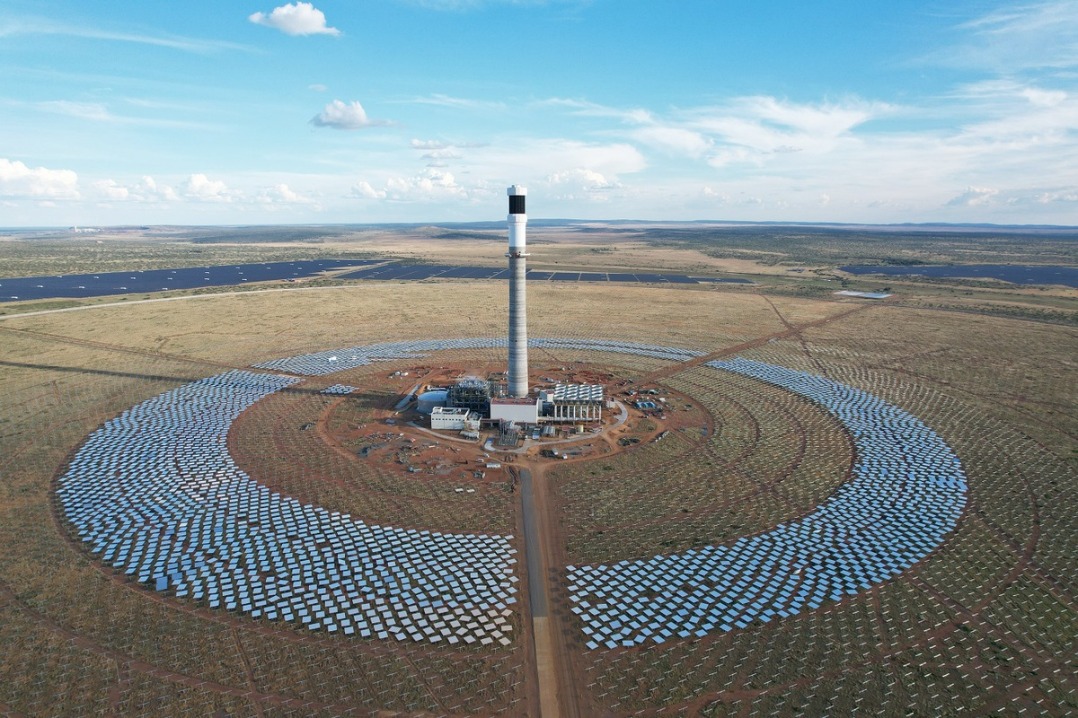Major Renewable Energy Developments Near Completion
In the vast, semiarid region near Postmasburg, Northern Cape Province, South Africa, the construction of one of the country’s biggest renewable energy power plants is nearing completion. The Redstone Concentrated Solar Thermal Power Project is expected to begin trial operations soon. Eventually, it will generate enough energy to power 200,000 households, greatly alleviating the country’s acute power shortage.
Strengthening China-South Africa Energy Cooperation
Energy has been a major area of cooperation between China and South Africa. During President Xi Jinping’s visit to South Africa in August, in the presence of Xi and South African President Cyril Ramaphosa, the two countries signed several cooperation deals in Pretoria. These included agreements on emergency power, renewable energy investment, and upgrading South Africa’s power grids.
Since Xi’s visit, work on the Redstone power plant has accelerated. The steam generation system and solar receiving system are already complete. Trial operations are expected to start this month, with full operation scheduled before the end of the year. SEPCOIII Electric Power Construction Co, a subsidiary of PowerChina, is constructing the project.
Impact on Local Communities and the Environment
Gloria Kgoronyane, a resident of Jroenwatel village near the project site, eagerly awaits the Redstone plant’s operations. She hopes more power plants will be built to ease the severe power shortage, which has adversely affected her life over the past few years. “Load shedding has become more frequent since 2022. Every day we experience between two and four hours of power cuts,” she said. “We cannot watch TV, and sometimes the meat in the fridge rots due to load shedding.”
The Redstone project uses solar thermal energy, a clean source of energy, to generate electricity. “This aligns with South Africa’s environmental protection strategy,” said Xie Yanjun, deputy director and chief engineer of the project. “While contributing to reduced carbon emissions, it will also significantly ease the power shortage in South Africa.”
South Africa, which relies on coal for about 80% of its power needs, has faced a severe power shortage in recent years due to aging coal-powered plants, outdated power grids, and a lack of alternative energy sources. Frequent load shedding—distributing electrical power demand across multiple power sources—is common nationwide.
Future Prospects and Broader Cooperation
South Africa has vowed to gradually phase out coal-powered plants and seek renewable energy as a major means to achieve carbon neutrality by 2050. During Xi’s visit, which was his fourth state visit to South Africa, he emphasized intensifying bilateral cooperation in various areas, including energy, for mutual benefits. As the first African country to join the Belt and Road Initiative (BRI), South Africa signed a new agreement with China to enhance cooperation under the initiative.
Nandu Bhula, CEO of the Redstone project, said South Africa-China cooperation in energy under the BRI has strengthened over the past few years and benefited both sides. “The vision of President Xi regarding the BRI supports all countries in development and infrastructure improvement,” he said. “It’s important to collaborate with countries like China that can provide expertise in areas where a country is desperately needy.”
Bhula added that by cooperating with PowerChina and using cutting-edge technologies to build the power plant, South Africa will improve its ability to build similar renewable energy projects on its own in the future. “The expertise they bring in terms of concentrated solar power is fantastic. It’s a huge learning process for us,” he said. “With leading-edge technology, the Redstone project is revolutionary. It can provide 12 hours of energy storage, running 24/7 if needed.”
Bryce Muller, a quality control engineer for the Redstone project, hopes major renewable energy projects will also reduce load shedding in the country. Xie, the project’s chief engineer, believes that with the BRI’s implementation, more renewable energy projects will be constructed in South Africa and other countries to meet the increasing demand for power and decarbonization efforts.
In addition to renewable energy, China-Africa cooperation extends to areas like industrial parks and vocational training, supporting the continent’s industrialization and modernization. During his meeting with Ramaphosa in Pretoria, Xi expressed China’s willingness to use various cooperation platforms, such as the China-South Africa Vocational Training Alliance, to intensify bilateral cooperation in vocational training, promote youth employment exchanges, and help South Africa cultivate needed talent for economic and social development.
Source:usa.chinadaily.com.cn





